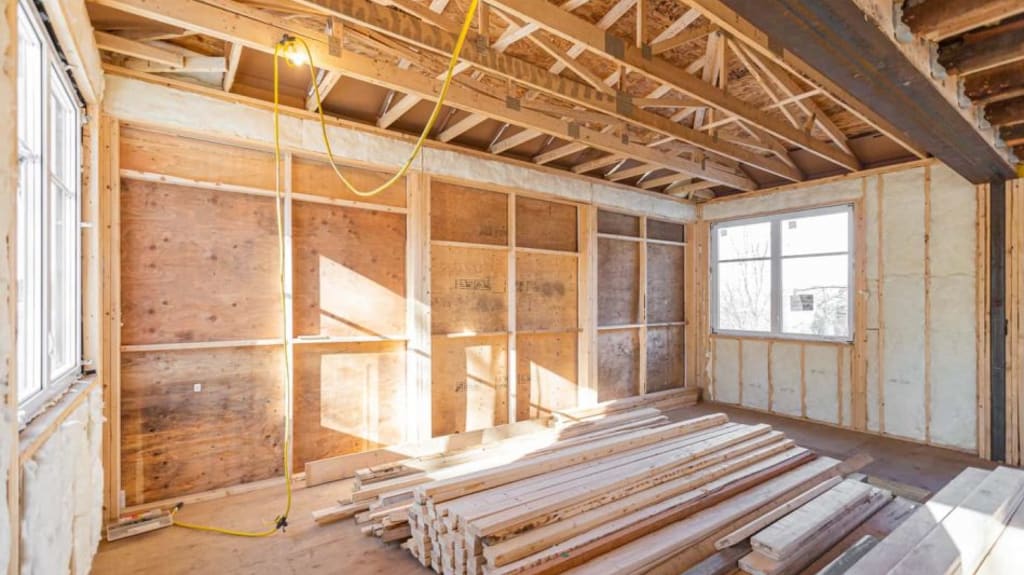The decision has finally been made: your renovation project «for later» can’t wait! How do you go about it, and where do you start? Here are 9 tips to help you prepare for a major renovation.
Renovate or wait?
The right time to renovate depends on a number of factors. Ideally, choose a period with mild weather conditions, such as spring or summer for exterior work. Make sure your budget is sufficient to cover costs and contingencies. Plan restoration work when it will cause the least inconvenience, such as during vacations or when your schedule is lighter. Take into account the availability of professionals and materials, which can vary according to the season.
The third edition of the Renovation Intentions Survey, conducted jointly by RénoAssistance and the Association des professionnels de la construction et de l’habitation du Québec (APCHQ), reveals that for 41% of respondents, renovating is a project they think about for a long time. For 28%, it’s an urgent situation, such as a breakdown, obsolescence or damage, that forces them to act quickly.
Planning your renovation
Renovation planning is essential to manage the budget, avoid cost overruns and establish a realistic schedule. It also helps coordinate and select contractors, choose the right materials and plan for unforeseen circumstances. Careful planning also ensures compliance with regulations and minimizes day-to-day disruption. With a clear vision of the project, you can better prepare for imponderables. A smoother, less stressful process makes renovations more efficient.
Where to start?
1. Analyze your needs
Discuss desired changes and style
This first step is often neglected or poorly documented. To guide your choices, it’s important to make a list of what you want to improve, but also of what you like about your home (the elements and rooms you want to keep as they are).
What major renovations would you like to undertake? An extension or a storey addition? A basement conversion or a kitchen makeover?
What style do you like? Do some research, get inspired by looking at the trends, and write down the ones you like best.
Think about your family’s future needs
A major renovation entails considerable costs. So it’s important that you make the most of it. Where will you be in ten years? If your children are leaving the family nest in three years’ time, there may be no need to create a study area for them after they’ve monopolized the kitchen table for so long! This analysis is crucial to determining your needs.
2. Follow the market: how much are houses worth in your neighborhood?
Consider your neighborhood’s ability to «take» your renovation. For example, if the houses in your neighbourhood sell for around $300,000, make sure that yours, once the work is completed, won’t fetch $750,000! You don’t want your home to become the most expensive in the area. Unless you can afford it and want to live there for another twenty years… It’s your decision!
3. Get floor plans for a major renovation
Once you’ve established your needs, it’s time to assess the feasibility of your project. To do this, you need to contact an expert in residential architecture, such as an architect or technologist, who can create your plan.
Some firms offer a turnkey service: the architect comes to your home to study the project, determine its feasibility and give you an idea of costs.
Next, the residential architecture expert will analyze your home, its structure and its ability to withstand renovations. He/she will survey your home and add any changes, creating a first draft of your plan.

4. Find reliable contractors and request quotes
With your preliminary plan in hand, you can contact contractors to obtain quotes.
Note that most of them will offer you a lump-sum estimate for the work. If the project involves complex or subcontracted work (e.g., work by an electrician), these may be added to the contract separately, sometimes at an hourly rate.
Surprises and unforeseen events
Major renovations sometimes reveal surprises and unforeseen circumstances. The contractor may detect structural problems that need correcting, weakened or damaged beams, plumbing pipes that need relocating, water infiltration or even a non-compliant electrical system. These changes will be discussed along the way, but may have an impact on the time spent on site, as well as on the final bill.
5. Budgeting for a major renovation
Adjust according to quotes
Once you’ve received the bids, it’s time to make the tough decisions, because the estimate is often higher than you first thought. By talking to the contractors, you’ll be able to make some changes to keep within your budget. Once you’re comfortable with your choices, you can pass these changes on to your renovation planner, who will make the final adjustments and layout.
It’s a good idea to have your contractor and your renovation planner work together. Thanks to their personal experiences, their exchanges could generate excellent ideas and create a bond that will serve you well throughout the project!
Plan your budget to cope with the unexpected
One of the most important elements of any renovation project is to set aside at least 20% of the budget for surprises and «while you’re at it». Most projects result in cost overruns – plan for them!
Remember to ask your contractor questions. Discuss how you want to be informed of unforeseen events, and add this agreement to the contract.
Financing and subsidies
Don’t hesitate to meet with a financial advisor to help you determine your budget and discuss financing options.
Research available grants. You may be able to access them or benefit from advantageous rates if the renovations are aimed at increasing your home’s energy efficiency.
6. Where to stay during renovations
During major renovations (kitchen, bathroom, moving walls, etc.), we strongly advise you not to live in your house. The noise, the dust, the early morning arrival of the workmen, the constant coming and going, the water or electricity cuts, the dishes to be washed in the bathtub, your clothes strewn about because the wardrobes no longer exist, the bathroom without a shower… In short, you get the picture!
That’s why it’s best to live off-site (rent a house, an apartment or, why not, go camping!) while the work is in progress. Try not to move too far away, so you can visit the site if necessary.

7. Store your belongings
Think about your belongings: will you need to store the contents of certain rooms during the work? If so, you’ll need to consider renting a storage unit, or enlisting the help of friends and family with large basements or sheds!
8. Notify your insurer
Contact your insurer to update your home insurance file. If your renovations are likely to cause damage, the premium may be adjusted during the work.
What’s more, your insurance may be revised to reflect the value of your home once the work is completed.
9. Relax
Major renovations turn your daily life upside down, involve expenses, decisions and stress. Remember that it’s temporary, and keep in mind that it’s for your long-term comfort. In short, relax and think about how good it will be to live in your newly renovated home.
Happy renovating!





